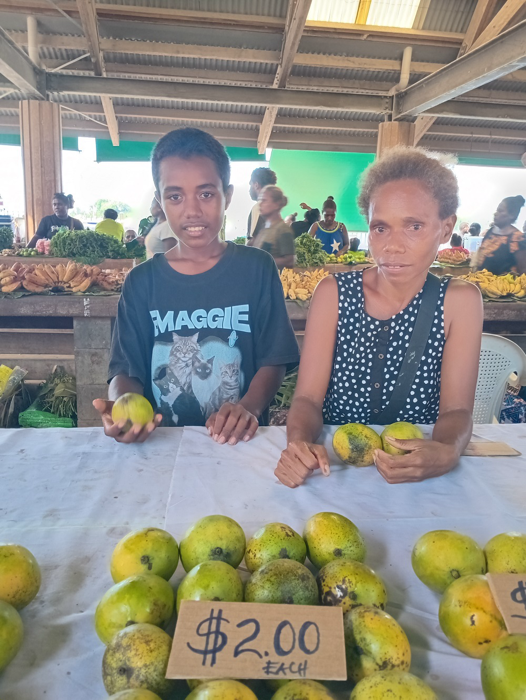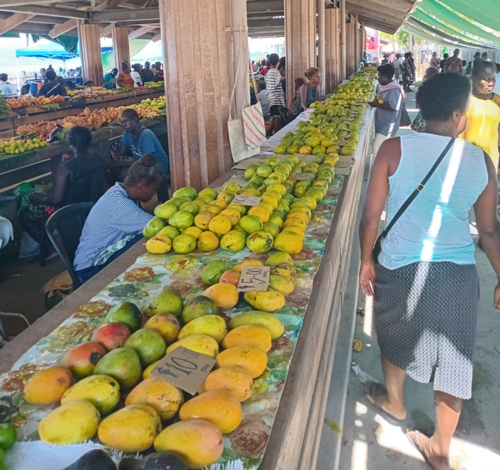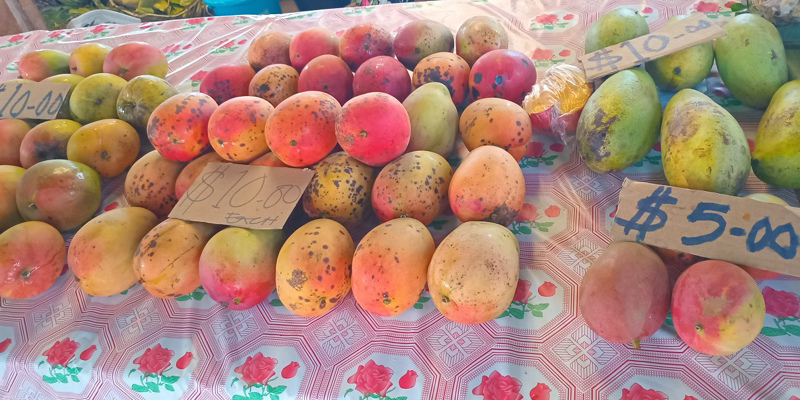ITS the first time for Emily, her husband Pita Trisha and their younger son Junior to travel 237 Miles from Honiara to Gizo, the Western Provincial capital, to sell mangoes.
The couple from Visale in North West Guadalcanal have five children – three of whom are married and two, including Junior, who are still in Primary School. Junior is a Grade 5 student at Visale Community Primary school.
Emily, Pita and Junior have been in the Western Provincial Capital for three weeks now selling mangoes in an effort to make more money.
Mangoes is one of the favourite fruits amongst Gizo residents and people from the nearby islands.
So there’s mangoes on sale at the Gizo market, they took the opportunity to buy the fruits and enjoyed it.

Junior will be boarding a passenger vessel by next week to Honiara to return home and resume classes.
Like most women from North West Guadalcanal, Emily usually sells mangoes at the Honiara Central Market, but she along with her husband and their son decided to travel purposely to Gizo to see if they can make more money from these commodities in Gizo.
Travelling from Honiara to Gizo takes more than 24 hours on board Marina 5. They took that journey from Honiara to Gizo, arriving at night. Their night arrival means they had to wait until morning to unload their goods.
After they settled in the Western Provincial capital, they proceeded with the selling of their mangoes at the main market facility as of the next night.
So far, they sold more than 30 bags and five trays of a variety of mangoes and spent around $2000 dollars on freight charges. Their sea fares to Gizo costed them $555.
Emily told Solomon Star in an interview this week that she appreciates the transport owners and security personnel at the Gizo Market for helping her and her husband unload their mangoes at the wharf and market.
She described Gizo market as a safe place, adding that people are respectful and she and her family enjoyed walking around the township.
“Our sales are going well. We stay with our relatives at Jah Mountain, and every morning at 6 am, we walk down here to the market to begin our usual sales,” Emily said.
Emily said selling mangoes in Gizo is a unique and rewarding experience compared to Honiara.
“There are a lot of vendors selling mangoes in Honiara, so we decided to try out Gizo. The competition there is very high. Based on what our wantoks told us, selling mangoes in Gizo is more financially rewarding during mango seasons,’’ she added.

Emily’s daily earnings from her mango sales in Gizo fetches her around $600, but on good days, she earns more than $1,000.00.
“Once our stock of mangoes is sold out, we will sail back to Honiara and return to our village,” she said.
This month marks the peak mango season, which is a crucial time for Emily and Pita to sell as many mangoes as possible to pay for their son’s school fee and meet other expenses relating to his education and meet their church and community contribution obligations, medical expenses and community fundraisers.
“I have two children (including Junior) still in school and three who are already married. I am grateful that our mango sales have helped sustain us,” Emily said.
Emily and Pita are just amongst a good number of people from Guadalcanal who travel to Gizo to sell their produce.
People from Guadalcanal often travel to Gizo with their mangoes, melons, pineapples, peanuts, and other produce to sell, boosting the variety of produce sold at the Gizo Market.
For many Guadalcanal families, selling produce like mangoes help them buy materials to build permanent houses, purchase vehicles, start businesses and acquire assets to improve their living standards.
By ULUTAH GINA
Solomon Star, Gizo









